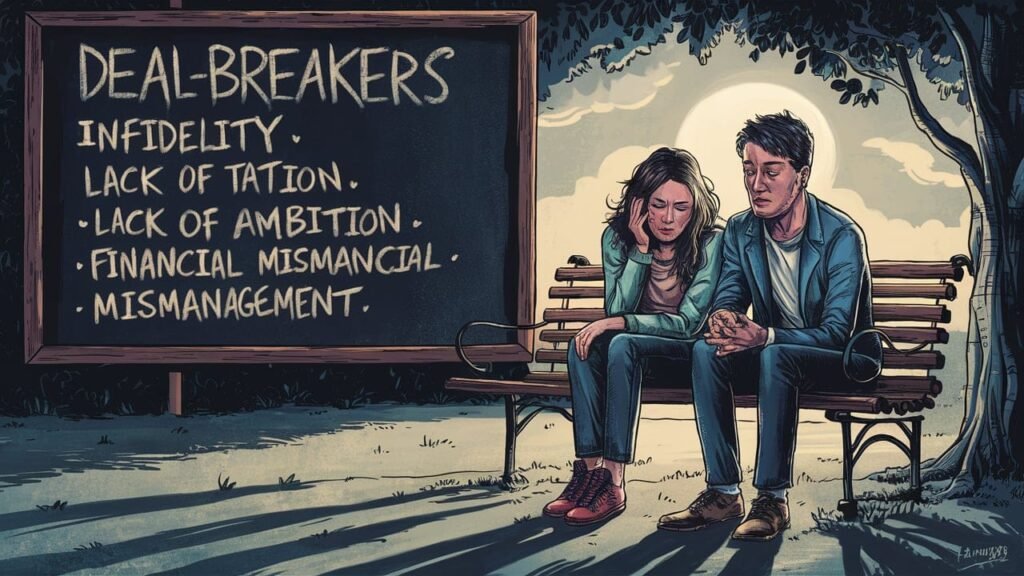Share This Article
In the beginning of a relationship, you put your best foot forward. You behave exemplarily and impress with the best parts of your personality. Both you and your new love emphasize the best qualities, while carefully hiding the flaws. But, as we all know, that can’t last forever.
Over time, your true self comes more and more to the fore. You notice that you have given up freedom and gradually you discover certain habits of your partner that start to irritate you more and more . In short: it becomes more difficult, doubt creeps in and the problems pile up. But when is it too much? When do you break off a relationship?
ALSO READ: One-Sided Relationship? 22 Signs It’s Coming from One Side

When is it too much?
The tricky thing about dating is that you immediately form an impression of a partner’s physical characteristics. A beautiful jawline, slim legs, wavy hair: these are the qualities you notice immediately and fall in love with. Other qualities, such as personality, routines, quirks and habits, are revealed much more gradually. And as you learn more about someone, you are better able to understand who you are dealing with.
Over time, you discover more and more qualities that can be both positive and negative. Since no one is perfect, there are always a few qualities that you can label as negative in a partner. But how many of these negative qualities – also called deal breakers – do you throw in the towel after? That is exactly what psychologists from Western University in Canada have investigated .
ALSO READ: Is He The One? Not If He Does These 25 Things
Decision points in relationships
To find out when people end a relationship , the psychologists decided to investigate. 1,585 participants were allowed to read a story about a relationship in the dating phase in which they themselves were given the leading role. Because during a new relationship you are confronted with a decision about the future of the relationship at various moments, the researchers also added these decision moments to the fictional story.
At 17 points in the story, participants could decide whether to continue dating or end the relationship. During these points, they learned some new information about their new partner. This new information was potentially a dealbreaker, such as being clingy , lazy, and having a bad sense of humor. In other words, qualities that no one wants in a partner.
As the relationship progressed, the participants gained more information about their dating partner and thus more knowledge about the deal breakers. Based on the participants’ answers, the researchers were able to determine when people – on average – end their relationship.
ALSO READ: Couples Have More in Common Than We Think’
What the researchers discovered
In theory, deal breakers are the reasons why you can end a relationship. But that’s the theory. In reality, not every deal breaker is a “relationship breaker.” The research reveals that one relationship problem is usually not enough to end it. But the deal breakers do add up over time, so that together, the deal breakers escalate into a reason to end the relationship .
The research shows that people are fairly relaxed about deal breakers. The participants did not treat the deal breakers as triggers for ending the relationship. They dealt with them flexibly. For example, an unattractive and sloppy appearance should be a reason to end the relationship. But it often did not. In practice, people give their relationship more chances and choose to first get to know more about the other person before they finally end the relationship.
ALSO READ: 114 Best Date Ideas for First, Second and More Dates
4 deal breakers are too many
Although we all have the idea that every dealbreaker is a reason to end a relationship immediately, the reality is a bit more nuanced. For most people, discovering the first dealbreaker is not a reason to declare the person ‘undateable’. However, the negative qualities do have a cumulative effect, the research shows.
As participants discovered more negative traits, their likelihood of a breakup increased. They only ended their relationship after discovering four dealbreakers. Participants with a longer list of dealbreakers ended their relationship faster, while the relationship also ended faster if there was a dealbreaker that was important to them – for example, a participant cared a lot about political preference and discovered that their partner had opposing views.
“People tend to view deal breakers as fixed pieces of information that would automatically cause someone to end a relationship. But our findings suggest that many relationship issues that are considered deal breakers do not cause people to end relationships outright,” said Nicolyn Charlot, one of the study authors.
Before the study, the psychologists suspected that people wouldn’t immediately end a relationship upon discovering a single dealbreaker. But they were surprised to see that most people don’t make the decision to end it until about four dealbreakers have occurred.
“People often say they would never date someone who has different political beliefs, but when you’re presented with a complete person and that’s just one facet of their personality, it’s not so black and white,” Charlot explains. “You can choose to continue anyway, unless you notice other issues.”
P.S. Are you already following Gistinger.com on Facebook , Instagram and Twitter?

